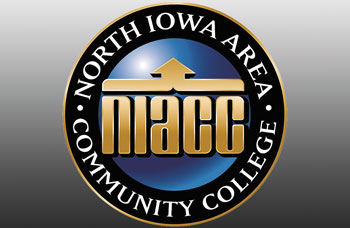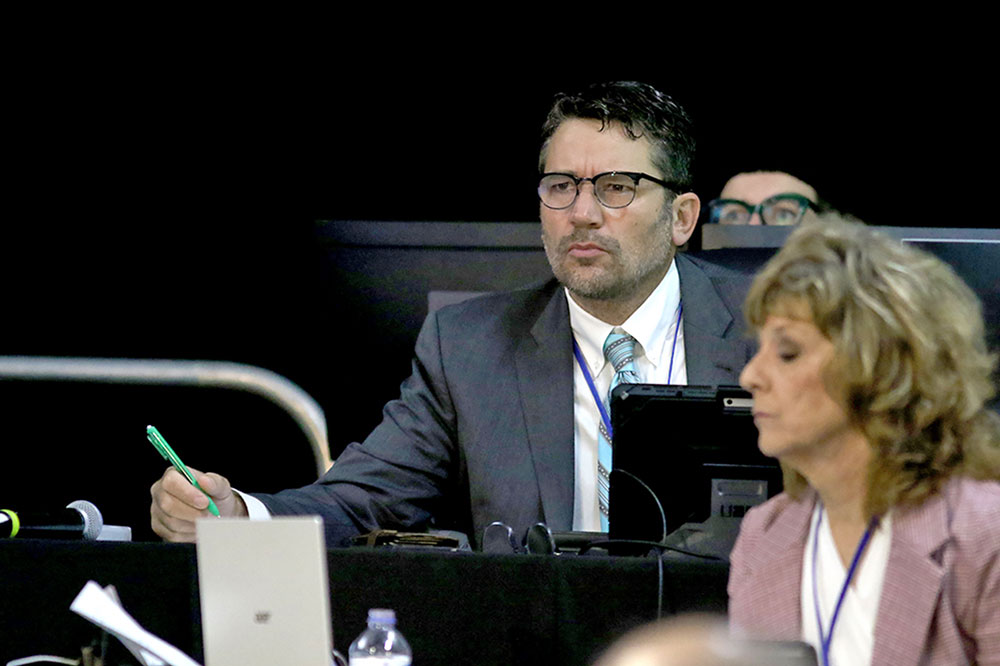Water quality, worker’s comp, minimum wage on table at Saturday forum

By Kate Hayden, khayden@charlescitypress.com
A Saturday legislative forum filled the basement at the Chickasaw County Farm Bureau in New Hampton, as Sen. Waylon Brown, R-St. Ansgar, and Rep. Todd Prichard, D-Charles City, took questions from constituents.
The forum marked the end of “funnel week” at the state Capitol; policy bills were required to be passed through committees by Friday to make it out for Senate or House consideration.
Both Prichard and Brown opened the forum by addressing worker’s compensation bills, House Study Bill 169 and Senate Study Bill 1170. Critics say the bills cut away benefits from employees in vulnerable job positions, while proponents say the bills trim down an excessive worker’s compensation system that favors employees over small businesses.
“It’s not a bill I can see myself supporting at this point,” Prichard said.
Brown said he was studying the bill, but “there’s some things in there that I’m not happy with, and as an employer I think that needs to be something that we really take a look at and make sure that it’s doing what it’s supposed to do, and also be fair for everyone.”
In the course of an hour, both Prichard and Brown were challenged by constituents on minimum wage, Chapter 20 collective bargaining reforms, weapons and so-called “Stand Your Ground” legislation, and water quality legislation. Questions began with Charles City resident Karen Nolte, who asked about a House bill that would lower minimum wages raised at county levels to keep the state wage uniform.
Iowa’s minimum wage law could be updated to include some “tiers” to differentiate between minimum wage, Brown said in response.
“Should it be directly tied to our cost of living in regions, or should there be two separate wages? Maybe there’s a cost of living wage and maybe there’s a minimum wage for minors that are under the age of 17 that are still dependent on somebody else,” Brown said. “I’ll be the first one to say minimum wage is too low. Nobody can live on what minimum wage is set at, but on the same token, are those jobs supposed to be jobs for you to live on, or are they entry level jobs to where you’re able to learn how to be in the workforce?”
“I’m concerned about the minimum wage but I’m also concerned about the median wage,” Prichard said. “We’ve got to find a way to effectively grow wages in rural Iowa and across Iowa, because we don’t want to be in a situation where we don’t have an attractive labor or job market compared to neighboring states and things like that.”
“This is the first bill that’s dealt with minimum wage, and it’s basically going to tell Johnson, Linn, Wapello and whatever other counties, you’ve got to retreat back on your minimum wage,” Prichard said.
Two school district Board of Education members spoke up in criticism of the Chapter 20 reforms, which limited collective bargaining issues for all Iowa public employees, including public school teachers.
“Could changes have been made? Absolutely,” Charles City Board of Education member Jason Walker said to Prichard and Brown. “In the arbitration side of that, some tweaks and some changes could have been made to level the playing field, per se. That didn’t happen. It became a very hyper-partisan bill that had no support on the other side of the aisle. That’s what bothers me the most, there was no negotiations and no opportunity for the other side to have an opinion on it.”
“I haven’t talked to anyone on the management side of the issue who wanted this bill to go forward. It’s not just the contract worker,” Damian Baltes, board member for the New Hampton School District, said. “We believe that it’s going to shortchange us on attracting, hiring and keeping good people.”
Others spoke out in support of the new law. One man, who said he employed “almost 1,000 people in seven different states,” said “my employees have always been jealous of the state workers and the county people for the benefits that they have.”
“We’ve had to raise our deductibles, raise our premiums, they’ve watched the state people and the county people, the benefits just grow and grow and grow consistently,” the man said. “The good things about this bill in the long term … the school boards will have the ability to pay the good teachers more money and the bad teachers less money, and eliminate tenure. There’s nothing sacred about being a school teacher versus a concrete driver … That doesn’t mean that you have more rights than the rest of the public sector.”
Brown and Prichard also answered questions on the 3/8 cent sales tax, which is commonly brought up in discussions on funding water quality initiatives in the state. Some constituents said they would be in favor of the tax if there was a sunset provision, requiring review of the tax by the Legislature in the future.
The tax was initially voted on in 2010 and supports the IWILL Trust Fund, which funds natural resource conservation practices in the state. Once increased, the sales tax would be Constitutionally protected and would always go to the IWILL fund. If taxes are dropped or increased, that 3/8 of a cent is still earmarked for the IWILL fund.
“It’s one of the tools that’s been talked about … to start working on some good water quality initiatives,” Brown said. “There’s a lot of pieces to this.”
A few constituents also asked Brown and Prichard to be wary of any bills that had no opposing party support.
“Waylon and I have a good working relationship,” Prichard said in response. “There’s a lot of bills that aren’t necessarily good for rural Iowa … I’ve always prided myself in just common sense, and I think Waylon –– you’ve shown that too. That’s what we’re trying to do.”








Social Share